Formation
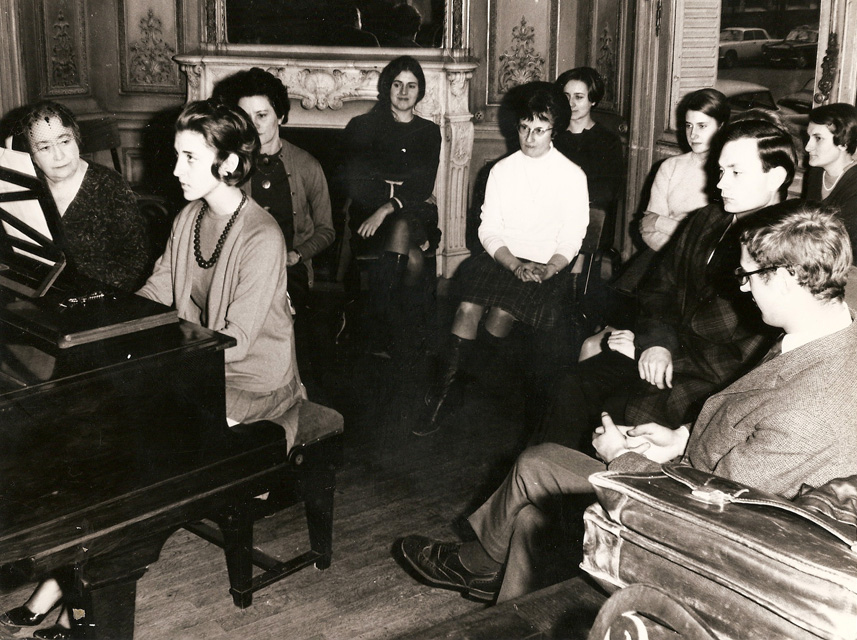
In the Virtuoso Class of Mme. Bascourret de Gueraldi, at the Ecole Normale de Musique, Paris, 1968.
John Robilette has studied with some of the greatest artists, performers and teachers in the world. His formation as an artist was overseen by assistants to Alfred Cortot and Artur Schnabel in Paris and Los Angeles respectively, and then in London with Peter Feuchtwanger and Louis Kentner. He came at the tail end of an era call the "Golden Age of Pianism" where many of his teachers had a direct link to an era and way of hearing sound that had long vanished. Names like Cortot, Schnabel, Moisevitch, Fisher, Harold Bauer, Josef Hoffman, and Paderewski that strode like giants on the concert stage in the 1920's and 30's were no more and their style of playing, which is much different than today, has disappeared. However, when John Robilette made his debut at the Kennedy Center in 1984, critics began to hint at something curious. Wendell Margrave, the critic for the Washington Post and Star, wrote that he hadn't heard such a good Carnaval (Schumann) "since Myra Hess. This is piano playing that was commoner around 1930 when there were fewer pianists but better ones." Myra Hess, the great British pianist, had by then, of course, been dead for years. Then, when Mr. Robilette had his first overseas tours in 1987 and again in 1988, a leading critic in Caracas (Daniel Salas of El Nacional), thought he noticed "the close influence of Alfred Cortot." The great French pianist, Cortot, is considered today among aficionados to have been perhaps one of the greatest recreative artists and pianists of the first half of the twentieth century. His old recordings now reissued, still inspire countless listeners who want more from an interpretation that a sterile, literal reading of the printed score. In the last several years, as John Robilette's playing has reached fruition, European critics are now saying flat out that he is a throwback to the "Golden Age of Piano Playing." In 2002, Arietta, the English journal of the Beethoven Piano Society of Europe, said that " Robilette's intensely poetic approach recalls those magnetic interpreters of the past." In 2007, a review in Morgunbladid, of Reykyjavik, Iceland, said he "performed with Horowitzian flair." In 2008, in the "Black Forest" of Germany (Freibrug/Waldkirch) , a review of Mr. Robilette's recital in the Badische Zeitung , announced simply that "his playing is like that of the 'Golden Age' of piano playing." The tone quality of sound, the polyphony and inner voice leading, the elastic flexibility of rhythm, the soaring lyricism and evocative poetry, vivid and colorful, and then the declamative style are all redolent of another age and another way of hearing and structuring sound. Freedom through discipline. Because of this, Mr. Robilette also is able to project emotion, which is the purpose of art. He can feel an audience. This is an indefinable gift. Listen to the playing examples provided beginning with the F Minor Fantaisie of Chopin.
Studies
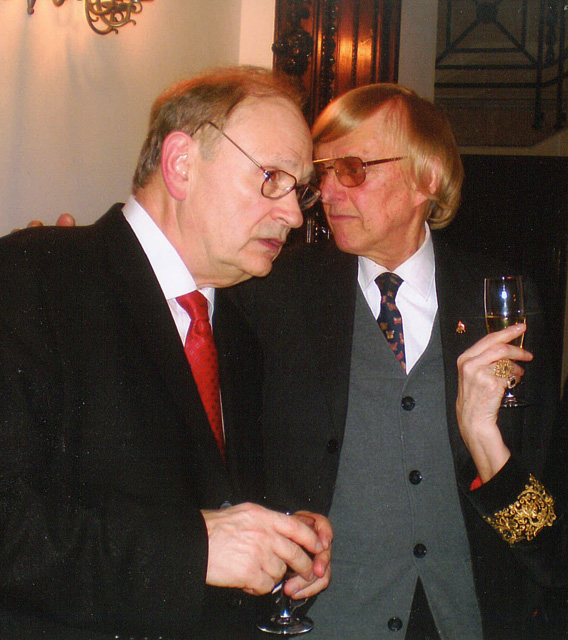
With Peter Feuchtwanger in London, 2009
John Robilette was born in Chicago Illinois and raised in the Midwest, the geographic center of the United States. His first teacher was a pupil of Cortot and arranged for him to study in Paris with a former assistant of Cortot, the legendary Mme. Bascourett de Guèraldi. Mr. Robilette was in her "Virtuoso Class" at the École Normale de Musique for two years. He then went to Los Angeles, California to study with a former assistant of Artur Schnabel, (Aube Tzerko) and from there was sponsored for still further study under Peter Feuchtwanger and Louis Kentner in London, England.
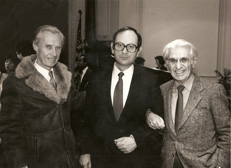
With Ozan Marsh and Aube Tzerko, 1986.
While still a student in 1974, Mr. Robilette, was chosen from nation wide auditions as a Tanglewood Fellow and spent the summer studying and performing chamber music under the aegis of members of the Boston Symphony and the late Raymond Lewenthal. He was award three public performances at that Tanglewood Summer Music Festival, one (the Liszt Grand Duo), was attended by, Gunther Schuller, Gilbert Kalish, Raymond Lewenthal and Mme. Olga Koussevitzky.
Performance Career
Mr. Robilette has since toured twenty-four countries throughout eastern and western Europe, Latin America and the Caribbean. He has performed in many of the major halls of the world, notably recitals at the Library of Congress and the Kennedy Center in Washington, D.C., the Wigmore Hall and St. John's Smith Square in London, and the Sala Cecilia Meireles in Rio de Janeiro, and has performed a recital and been interviewed over WNYC in New York City ("Around New York").
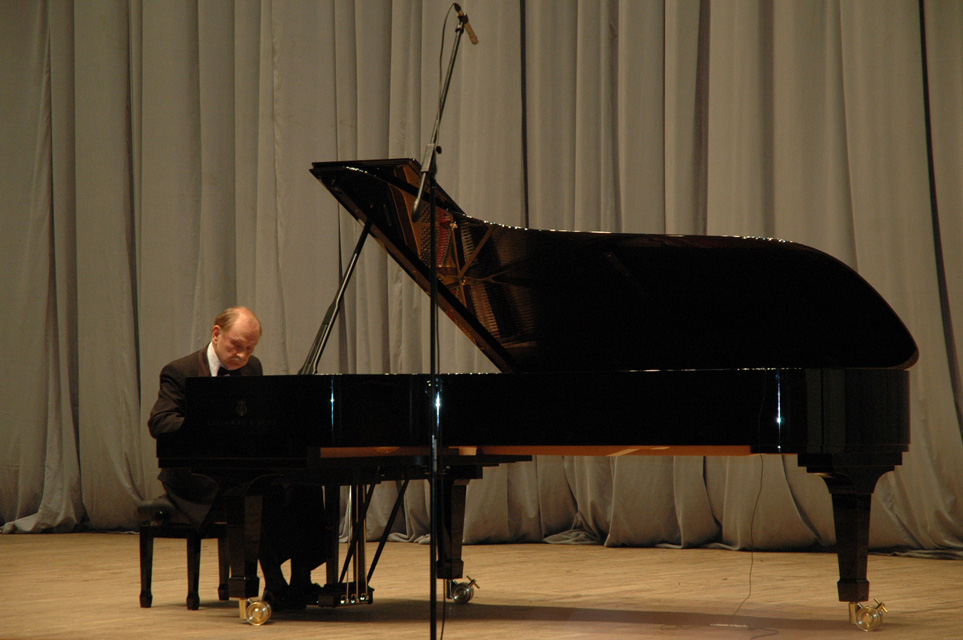
Concert at National Philharmonic Hall in Minsk
In the past five years he has concluded tours of Brazil, Argentina and Chile, Iceland, Poland, Russia, Hungary, England, Austria (four tours) and Germany (four tours) with the critic of the Franksiche Landeszeitung (Nuremburg/ Ansbach, Germany) saying: "He gave a fantastic interpretation of Schumann…Robilette's playing Is remarkable for it clarity and expression as well as the depth of feeling. An exceptional musician given to few dramatic gestures, he fascinates us repeatedly." Mr. Robilette has performed in: France, England, Russia, Belarus, Czechoslovakia, Poland, Hungary, Luxembourg, Italy, Portugal, Turkey, Switzerland, Germany, Austria,, Bulgaria, The Dominican Republic, Venezuela, Uruguay, Brazil, Argentina, Chile, Iceland, Holland and the United States. He has been invited to give special performances at the residences of American Ambassadors in Montevideo, Santo Domingo, Luxembourg, Minsk, Prague, Buenos Aires, and at residence of the Charges d'Affaire's (Wychwood House), in London.
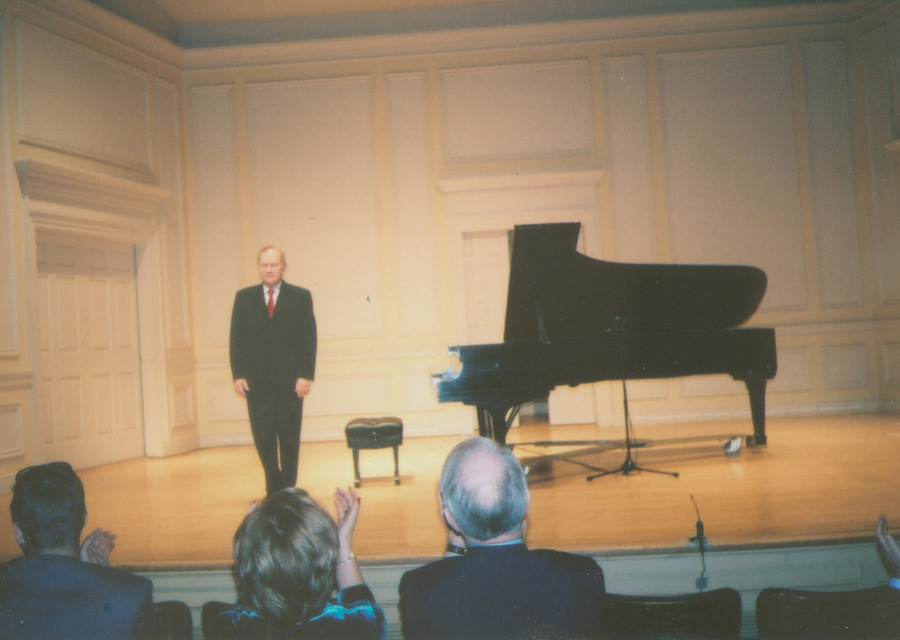
In concert a the Coolidge Auditorium, Library of Congress, Washington, DC, 2005.
His commercial CD recordings of piano concerti with the St. Petersburg Philharmonic in Russia, the Russian State Symphony, and the New Philharmonic of Sophia, Bulgaria, as well as solo repertoire, have been acclaimed in major record review periodicals in the United States, and have been broadcast throughout that country on public and commercial radio from coast to coast, including: Los Angeles, San Francisco, Chicago, Washington, D.C. and New York City, as well as the BBC radio in London, England.
Mr. Robilette has played with conductors such as Paul Freeman, Rossen Milanov, Herbert Blomstedt and Gordon Wright.
Teaching
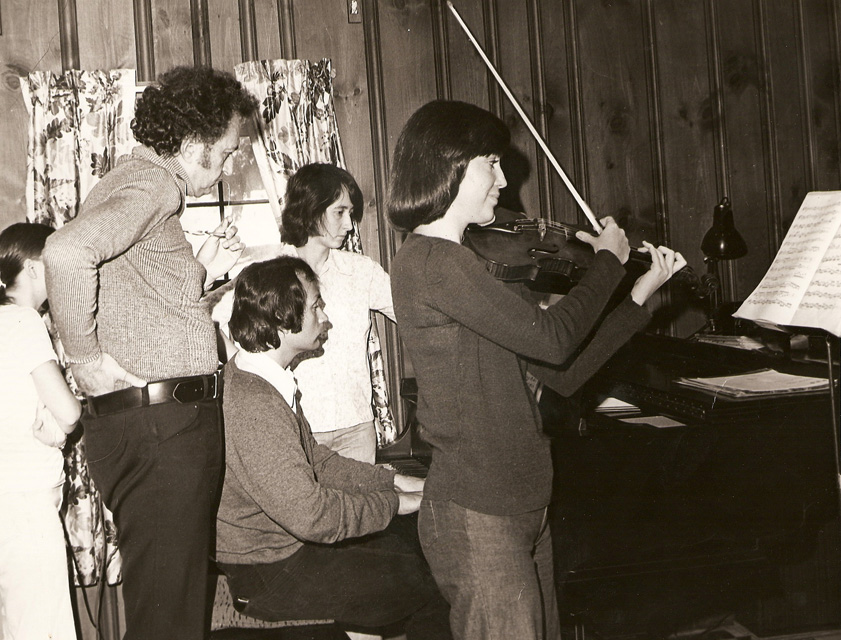
With Raymond Lewenthal at Tanglewood, 1974.
Mr. Robilette has given Masterclasses at the University of Tennessee at Knoxville, Rice University in Houston, George Washington University in Washington, DC, The University of Rio de Janeiro in Brazil, at the State Conservatory of Music (Belarusian State Academy) in Minsk, Belarus, and at the Mozarteum in Innsbruck, Austria.
Cultural Diplomacy and Administration
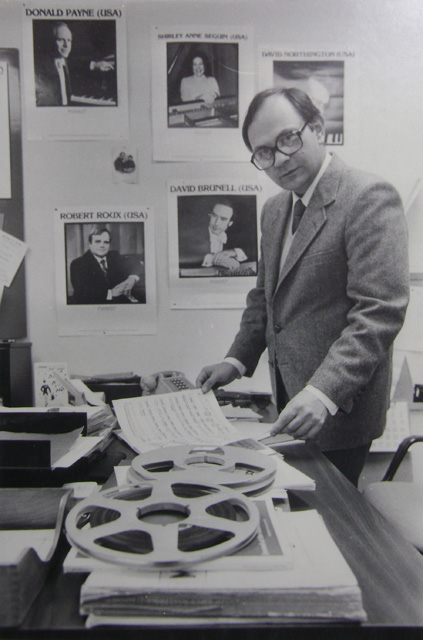
In the office as Director of Artisic Ambassador Program.
Mr. Robilette has also been involved in wedding the arts and music to US public diplomacy and cultural exchange, having created and directed the Artistic Ambassador Program for the American government in the 1980s'. This program which revolved around classical music, became popular in 63 countries around the world. Through that program, John Robilette commissioned 14 eminent American composers to write major piano works for performance overseas. These manuscripts reside in a special archive at the Library of Congress. The composers are: Morton Gould, Norman Dello Joio, George Rochberg, Ernst Bacon, Ross Lee Finney, Elie Siegmeister, Benjamin Lees, Leo Smit, Lee Hoiby, Robert Muczynski, William Mayer, George Perle and Lukas Foss.
In 2002, Mr. Robilette was asked to create a concert series for the Voice of America to celebrate its 60th year of broadcasting. He chose the finest American artists to perform in public concert every two weeks, in the Wilbur Cohen Auditorium, which was then broadcast to 30 million people around the world.
In 2005, as Director of the International Music Initiative, he has organized a major event at the Library of Congress in Washington D.C. with many distinguished cultural icons and political leaders of the United States, all calling on the American government to do more in using music to create understanding between people. A prominent newspaper columnist (Georgie Anne Geyer), syndicated in papers throughout the United States, wrote about the event calling John Robilette a "great pianist," and a "great American."







